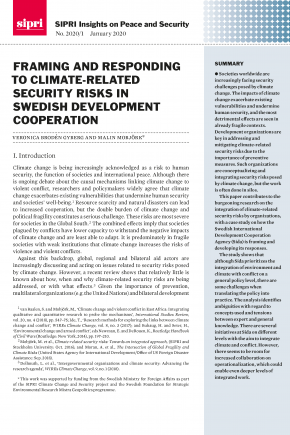Framing and Responding to Climate-related Security Risks in Swedish Development Cooperation
Societies worldwide are increasingly facing security challenges posed by climate change. The impacts of climate change exacerbate existing vulnerabilities and undermine human security, and the most detrimental effects are seen in already fragile contexts. Development organizations are key in addressing and mitigating climate-related security risks due to the importance of preventive measures. Such organizations are conceptualizing and integrating security risks posed by climate change, but the work is often done in silos.
This paper contributes to the burgeoning research on the integration of climate-related security risks by organizations, with a case study on how the Swedish International Development Cooperation Agency (Sida) is framing and developing its responses.
The study shows that although Sida prioritizes the integration of environment and climate with conflict on a general policy level, there are some challenges when translating the policy into practice. The analysis identifies ambiguities with regard to concepts used and tensions between expert and general knowledge. There are several initiatives at Sida on different levels with the aim to integrate climate and conflict. However, there seems to be room for increased collaboration on operationalization, which could enable even deeper levels of integrated work.
I. Introduction
II. Previous research and analytical points of departure
III. Materials and methods
IV. Multiple framings and a diversity of concepts
V. Enabling (dis)integration? Organization and support for working across silos
VI. Translating policy into practice
VII. Integration conundrums in Swedish development cooperation


